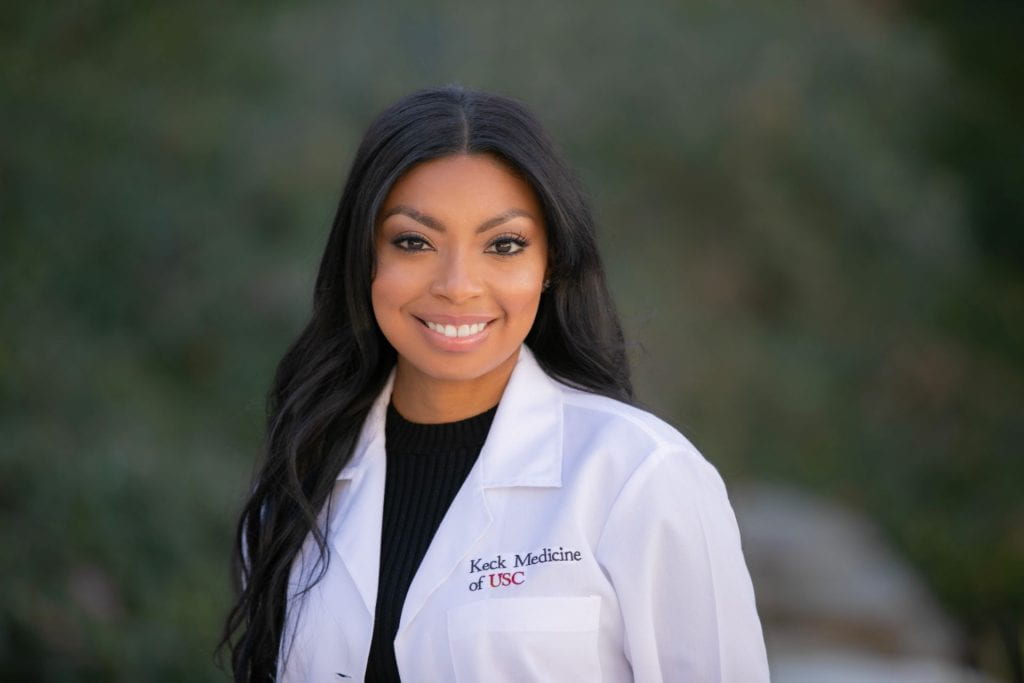Evelyn Mitchell

by Erin Laviola
Looking back on her residency at Los Angeles General Medical Center (then known as LAC + USC Medical Center), Evelyn Mitchell, MD, still remembers an encounter that affirmed her years of hard work.
The patient, a Black woman who had just given birth, started crying when Mitchell entered the room.
“She said: ‘I’m just so happy to see someone that looks like me,’” recalled Mitchell, who today works as an OB-GYN at USC Verdugo Hills Hospital, part of Keck Medicine of USC.
“I’ll never forget her. It was such a big moment for me.”
Mitchell wants those meaningful moments to become routine. A Keck Medicine provider since 2015, Mitchell is committed to fostering a workforce that reflects the diversity of Greater Los Angeles and whose providers make every effort to deliver equitable, compassionate care.
Change, she knows, starts with action but also conversation.
“We all come in with different experiences and perspectives,” said Mitchell, who is also a clinical assistant professor at the Keck School of Medicine, where she serves as director of the OB/GYN Diversity & Inclusion Program, as well as an associate residency program director.
“Hopefully, by sharing our stories, we can gain empathy for each other and prevent biases and microaggressions from popping up.”
A path to medicine
Mitchell’s first exposure to medicine came during high school in Lubbock, Texas, where a magnet program allowed students to shadow physicians in a local hospital.
On one occasion, the 16-year-old participant even helped deliver a baby — an exchange that ultimately changed her life.
“I remember walking into the delivery room, and she was a Black OB/GYN,” said Mitchell, who that day helped the doctor assist the patient with breathing exercises and other tasks. “I had never seen a Black doctor before. I didn’t know that even existed. She showed me that I can do this, too.”
Still, Mitchell has faced challenges. She identifies as biracial — her mother is Mexican and her father is Black — and “was always the only one that was different” in the classroom. That divide continued into medical school, where she said she was one of only two Black students in her class of about 240 at Texas Tech University.
“We heard people say things like, ‘Did you see the Black people in the class? I wonder how they got here,’” Mitchell remembered. “But we knew we’d get through it.”
Battling implicit bias
As co-creator of Keck Medicine’s implicit bias curriculum, Mitchell said the training is critical for influencing the care of women.
“I think there’s a lot of stereotypes associated with being a female walking into medical systems,” Mitchell said. “Women are seen as being more emotional, sensitive — even dramatic — and that fear of being projected in that way is real.”
The voluntary program, offered throughout the year for Keck School faculty, staff, fellows, and residents, is also designed to help providers examine their own implicit biases and how they might influence the delivery of care.
Without the proper perspective, a woman’s menstrual cramps may be dismissed as normal, Mitchell said, “when, in reality, this patient is suffering from severe endometriosis.”
She witnessed this gap firsthand during her medical residency. The Black mother who cried with joy when Mitchell arrived had been labeled as “noncompliant” because she refused to wear postpartum compression devices.
But the woman simply hadn’t understood why she needed them. “After I explained it to her, she put them on,” Mitchell said. “She was just so appreciative that someone she could identify with walked into the room and had a normal conversation with her.”
Training the next generation
Mitchell’s role as associate residency program director for her Keck School department is focused on retention efforts — with the goal of making all residents feel supported.
“For me, as a student, it was really hard because I felt no one really knew what I was going through, and there weren’t forums or venues for me to talk about it,” said Mitchell, who has worked to build mentoring programs and activities for underrepresented residents — as well as an allyship curriculum for her department.
Such efforts can lay the groundwork for recruiting and retaining a diverse workforce.
“For students, residents and other faculty who want to come to USC, they need to see that there are people here who look like them,” Mitchell said. “They need to see that these people are not only just here but thriving here.”
Another key step: exposing young people to the possibilities of a career in medicine.
“Pipeline programs are really important,” Mitchell said. “How do we get our junior high kids interested in medical school and then later, into our residency program? How do we get high school kids to help deliver a baby? Those kids could be the next OB/GYNs leading the way.”